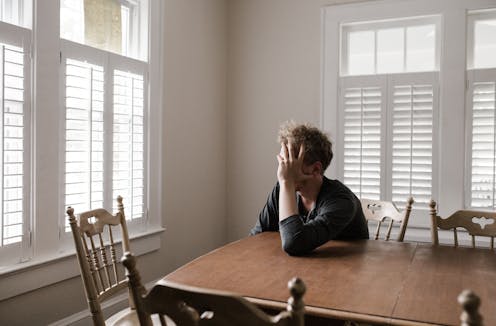How might the latest George Pell coverage affect child sexual abuse survivors?
- Written by Kim Felmingham, Chair of Clinical Psychology, The University of Melbourne

You might have wondered if the recent death of George Pell, who was jailed in 2019 for child sexual abuse and then later acquitted, would bring a sense of relief or closure for victim survivors of Catholic clergy sexual abuse.
After all, the Royal Commission into Institutional Responses to Child Sexual Abuse found Pell had failed[1] to do enough during his time in senior church roles in Australia to stop priests who abused children.
In fact, news of Pell’s death may generate a roller coaster of complex and variable emotions among abuse survivors.
This mix of emotions may include sadness for the ongoing consequences of the abuse for fellow victim/survivors, and anger at the lack of justice for so many.
There’s also the potential post-traumatic stress reactions triggered by this recent round of media coverage – such as fear, dissociation, distressing memories and sleep disturbance.
Read more: George Pell: a 'political bruiser' whose church legacy will be overshadowed by child abuse allegations[2]
Lifelong impacts
Extensive research reveals how significantly childhood sexual abuse can affect a victim survivor’s self-identity, relationships and capacity to trust others.
Potential mental health[3] effects[4] include post-traumatic stress disorder (PTSD), substance abuse, and depression.
Evidence[5] suggests clergy-perpetrated child sexual abuse can lead to very serious mental health outcomes[6], impaired spiritual wellbeing and distrust in the church and God.
This can lead to significant isolation from family and the faith community.
Many survivors of clergy child sexual abuse report[7] struggling with a fragmented sense of self into adulthood. Significant grief at the loss of childhood and the freedom to develop to their true potential are common.
Clergy-perpetrated childhood sexual abuse is particularly toxic as the abuse is done by moral and spiritual leaders who are meant to protect the child, leading to a profound lack of trust[8] in others.
These effects are pervasive and can be lifelong. The impacts of trauma do not end with the demise of an abuser or the resolution of a court case. They will not end or be resolved with the death of Pell. In fact, recent widespread media coverage could exacerbate it.
Pell coverage may spark distress among survivors
Research[9] reveals intensive media coverage of traumatic events can increase PTSD symptoms acutely, particularly in those experiencing long-term trauma.
Greater cumulative media exposure can lead[10] to more adverse mental health outcomes.
This can occur in several ways, triggering:
distressing and intrusive memories of a survivor’s own abuse, leading to intense fear reactions, sleep disturbance and other PTSD symptoms
thoughts of injustice and institutional cover-up, leading[11] to anger, self-blame or lower self-esteem
rumination on what survivors have lost due to such abuse, promoting grief and sadness.
Many recent media reports and obituaries have highlighted the career success of Pell in reaching the upper echelons of the Catholic Church and his role as a spiritual leader.
Yet these accolades strike a highly discordant note with the findings of the Royal Commission[12], which criticised him sharply for not doing more[13] to protect children from dangerous priests.
Glowing media reporting about Pell may inadvertently increase distress among survivors.
Coming forward about child sexual abuse is incredibly, incredibly difficult and good psychological support following a disclosure is very important.
Not being believed, or being swept up in institutional cover-ups of sexual abuse makes poor mental health outcomes much[14] more likely[15] for those who survive it.
Media reports that focus on Pell’s career success and spiritual standing, without properly acknowledging outcomes from the Royal Commission, may reinforce this sense of not being believed and injustice at institutional inaction.
Research[16] reveals key predictors of not disclosing sexual abuse include fear of not being believed, shame and self-blame.
It is likely survivors of abuse are having a particularly tough time during this recent uptick of reporting around Pell and the broader problems of clergy child abuse.
It is vital their experiences and the impact of these experiences are fully acknowledged and validated, and survivors are provided with ongoing support.
Read more: 3 trauma takes the media gets wrong[17]
If this article has raised issues for you or you’re concerned about someone you know, call Lifeline on 13 11 14.
Correction: a previous version of this article used the incorrect name for the royal commission.
References
- ^ failed (www.theguardian.com)
- ^ George Pell: a 'political bruiser' whose church legacy will be overshadowed by child abuse allegations (theconversation.com)
- ^ mental health (pubmed.ncbi.nlm.nih.gov)
- ^ effects (pubmed.ncbi.nlm.nih.gov)
- ^ Evidence (pubmed.ncbi.nlm.nih.gov)
- ^ outcomes (journals.sagepub.com)
- ^ report (pubmed.ncbi.nlm.nih.gov)
- ^ lack of trust (journals.sagepub.com)
- ^ Research (pubmed.ncbi.nlm.nih.gov)
- ^ lead (www.researchgate.net)
- ^ leading (pubmed.ncbi.nlm.nih.gov)
- ^ Royal Commission (www.theguardian.com)
- ^ not doing more (www.theguardian.com)
- ^ much (pubmed.ncbi.nlm.nih.gov)
- ^ more likely (journals.sagepub.com)
- ^ Research (pubmed.ncbi.nlm.nih.gov)
- ^ 3 trauma takes the media gets wrong (theconversation.com)

















